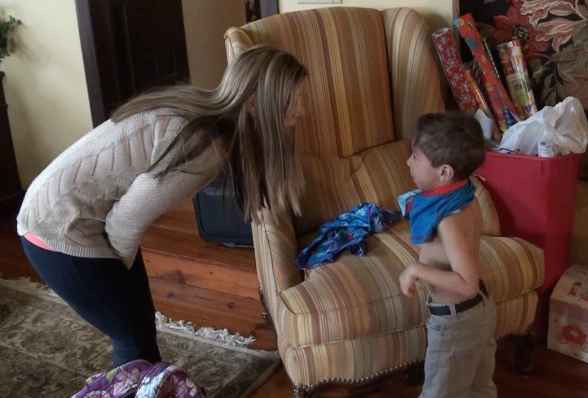
Is your toddler becoming a bossy-pants? Do you hear the words “no,” “mine,” “watch me,” and “I can do it” more and more everyday? Sounds like you have a typical toddler. He is experimenting with his new-found ability to use language to cause a reaction in people and sometimes even get what he wants.
Your toddler has learned that he can change the way you act and react based on the words he says and it is great fun. Especially since just months ago, he was not able to talk at all! He may yell for help when it is obvious that he does not particularly need help. She may yell “stop” when you talk for no particular reason. They are more interested in your response than actually getting help or making you stop talking. They are testing their effect on the world and the people in it. This is a very common way of asserting their newfound sense of independence.
Try to stay patient. Offer additional language. Perhaps you correct him by saying “help please” and then encourage him to do it himself, or help him a little bit until he can carry on independently. You can also add more vocabulary and language to his repertoire by using these situations as an opportunity to ask him some questions such as, “Why are you yelling for help?” Or, “Why do you want me to stop talking?” Try to get a conversation going. Try not to quickly respond to your toddler’s demands without engaging in a conversation first. This reminds him that you are in control and he cannot get away with being bossy because you expect him to be respectful and socially appropriate.
References:
Zero To Three
National Scientific Council on the Developing Child. (2011). Children’s emotional development is built into the architecture
of their brains: Working paper no. 2 (Updated ed.). Retrieved from http://developingchild.harvard.edu/wp-content/ uploads/2004/04/Childrens-Emotional-Development-Is-Built-into-the-Architecture-of-Their-Brains.pdf (Original work published 2004)
National Scientific Council on the Developing Child (2014). Excessive stress disrupts the architecture of the developing brain: Working paper no. 3 (Updated ed.). Retrieved from http://developingchild.harvard.edu/wp-content/uploads/2005/05/ Stress_Disrupts_Architecture_Developing_Brain-1.pdf (Original work published 2005).
Updated 2/27/19

